STOP Cancer Chart
Below in the STOP Cancer chart are other pathways and mechanisms that help stop cancer.
This chart targets commonly dysregulated pathways and mechanisms in cancer such as:
Angiogenisis-Blood supply to tumor.
IGF-1– A natural hormone that can fuel cancer.
Foods that cause apoptosis– Foods that can kill cancer stem cells.
It makes sense to cover all the bases you can to make your body inhospitable to cancer!

To print click here!
Colorectal Cancer Map

Common Dysregulated Pathways in Colorectal Cancer!
APC (Adenomatous Polyposis Coli) is a gene mutation associated with the hereditary condition called FAP (Familial Adenomatous Polyposis) that causes polyps to grow that may become cancerous.
One study found curcumin combined with resveratrol had a synergistic effect in preventing cancer cell growth in FAP patients!
https://www.ncbi.nlm.nih.gov/pmc/articles/PMC6205744/
- Curcumin AND Resveratrol together
Wnt-Beta Catenin is often overexpressed in colorectal cancer. It controls cell proliferation, cell migration and cell fate and over expression can cause genetic mutations. Wnt signaling pathway overexpression is associated with loss of function of the tumor regulator APC. The Wnt pathway cross talks with the Notch and Sonic Hedgehog pathways as well. The substances below have been found to inhibit Wnt pathway activation.
- Artemisinin-POTENT
- Curcumin
- Black Seed Oil
- Carrots
- Apigenin (Celery)
- I3C-POTENT (Broccoli Sprouts)
- Black Seed Oil
- Garlic fresh
P13k Regulates cell survival, proliferation and increased expression is associated with tumor progression. When over expressed it reduces apoptosis (cell death) and allows proliferation. The substances below have been shown to inhibit expression of P13k.
- Black Seed Oil
- Resveratrol (Grapes)
- EGCG (Green tea)
- Quercetin
- Fisetin (strawberries 37 per day dose)
- Luteolin
- Agigenin (Celery)
- I3C and Sulforaphane (Broccoli Sprouts)
- Ellagic Acid (Berries)
- Curcumin
- Carrots
Here is a great study with a nice chart-https://www.ncbi.nlm.nih.gov/pmc/articles/PMC5736021/
PTEN Is a tumor suppressor gene, so you want to activate it so it can suppress tumors. It’s also involved in genomic integrity or quality control of cells. Loss of PTEN expression decreases another tumor suppressor gene called P53. Below is a fantastically positive announcement about broccoli sprouts and PTEN!
- Broccoli Sprouts https://news.harvard.edu/gazette/story/2019/05/beth-israel-researchers-uncover-anti-cancer-drug-mechanism-in-broccoli/
- Carrots
COX-2 Is associated with inflammation which induces cancer. It promotes angiogenesis (blood supply to tumor) and tissue invasion of tumors and resistance to apoptosis (cell death). The substances below inhibit COX-2.
- Black seed oil-POTENT
- Apigenin (Celery)
- Beta-carotene (Carrots)
- Curcumin
- EGCG (Green Tea)
- Sulforaphane and I3C (broccoli sprouts)
- Vitamin C
- Resveratrol (Grapes)
- Garlic
- Carrots
- And more..
PPAR (Peroxisome Proliferator-activated receptors) This suppresses tumors, so you want to activate it! When PPAR is activated, COX2 decreases allowing apoptosis (cell death). The substances below have been found to activate PPAR
- Curcumin
- EGCG (Green Tea)
- Resveratrol (Grapes)
- Beta-carotene (Carrots)
- Apigenin (Celery)
- Lycopene (Cooked tomato)
- I3C- Broccoli Sprouts
- Carrots
P53- This is a tumor suppressor gene so you want to activate it! When it’s activated, it stops mutated or damaged cells from dividing by causing apoptosis (cell death) preventing the formation of tumors. The substances below have been shown to activate P53.
- Berberine-POTENT (supplement)
- Apigenin-POTENT (celery)
- Curcumin
- EGCG (Green Tea)
- Resveratrol (Grapes)
- Betacarotene (Carrots)
- I3C and Sulphoraphane (Broccoli Sprouts)
- Ginger
- Garlic
- Black Seed Oil
- Carrots
mTOR– is often overexpressed in colorectal cancer. Mtor overexpression drives cancer cell growth and angiogenesis. The substances below inhibit mTOR.
- Eliminate animal products
- Curcumin
- EGCG (Green Tea
- Resveratrol (Grapes)
- Luteolin (Radicchio, Carrots)
- Apigenin (Celery)
- Quercetin
- Indol-3 (Broccoli Sprouts)
- Berberine (Supplement)
- Black Seed Oil
- Garlic
TGF-Beta-is a tumor suppressor gene. When activated it decreases proliferation of cancer cells and increases cancer cell death (apoptosis). The substances below activate TGF-Beta.
- Apigenin-POTENT (Celery)
- Luetolin (carrots or radicchio)
- Quercetin
- Vitamin C
- I3C (Broccoli Sprouts)
- Berberine (Supplement)
- Black Seed Oil
- Garlic
EGFR Is commonly overexpressed in colorectal cancer. It regulates cell division and death.
- EGCG (Green Tea)
- Curcumin
Per table-https://www.ncbi.nlm.nih.gov/pmc/articles/PMC5327764/
MAPK– Overexpressed in many cancers. It regulates gene expression, cell growth and survival. Increased MAPK signaling leads to uncontrolled cell proliferation and resistance to apoptosis (cell death). The substances below inhibit MAPK expression.
- EGCG (Green Tea)
- Berberine
- I3C (Broccoli Sprouts)
VEGF (Vascular Endothelial Growth factor) is often overexpressed in cancer. VEGF stimulates vascular (blood vessels to tumor) cell growth, survival, and proliferation.
- Burdock root-POTENT (Essiac Tea)
- Artemisinin
- EGCG (Green Tea)
- Apigenin (Celery)
- I3C and Sulforaphane (Broccoli Sprouts)
EGFR (Epidermal growth factor receptor) is a protein on the surface of cells. It normally helps the cells grow and divide. The substances below inhibit EGFR.
- Curcumin
- EGCG (Green Tea)
- Resveratrol (Grapes)
- Luteolin (Radicchio)
- Apigenin (Celery)
- I3C – (Broccoli Sprouts)
- Berberine (Supplement)
- Burdock (Essiac)
- Black Seed Oil
- Garlic
![]()
The research above was inspired by Chris Wark’s many interviews of survivors overcoming the odds with natural substances. I wanted to know the science behind how natural substances healed people from cancer. Then I read Jane McLelland’s book How to Starve Cancer and wondered, are plants working the same way, so I made a map of how natural substances work like drugs.
I made it out of curiosity just to show how powerful food can be, and although I get a lot of emails on coaching due to this chart- I don’t use it. Why? Three reasons. A plant based diet lowers all three sides plus additional fuel (other amino acids in addition to glutamine) and additional stopping power, and that’s the most common path for long term natural cancer survivors so far (see my survivor list here.)Secondly plants do much more for cancer than blocking fuel, see what all a carrot does here. And then check out how colon cancer was stopped by dandelion here! Lastly, bacteria could be put in the middle of the chart and work the same. I believe bacteria is the cause of cancer and bacteria use the same substances for fuel (iron, glucose, fat, protein) and some bacteria can survive 100 days without food. Starving bacteria completely can also cause it to change behavior to aggressive or resistant. I think low fuel and changing terrain keeps bacterial behavior stable and prevents resistance. There are many food substances that kill bacteria without promoting those two factors and also REVERSE resistance!
I believe everyone is right and we are circling the cure!!!!! See my shocking slide show The Intracellular Infection Known as Cancer here to see why!
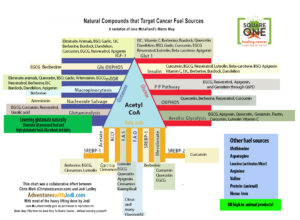
Print here
Endless studies support that a bacteria called Fusobacterium could be the CAUSE of colorectal cancer.
In colorectal cancer there’s an overgrowth of Fusobacterium and a deficiency of a protective bacteria called Lachnospiraceae.
The Standard American Diet fuels Fusobacterium. A whole food plant based diet has been proven to change the microbiome in as little as 24 hours increasing levels of Lachnospiraceae.
Here is a list I’ve made of substances that increase Lachnospiraceae while inhibiting Fusobacterium.
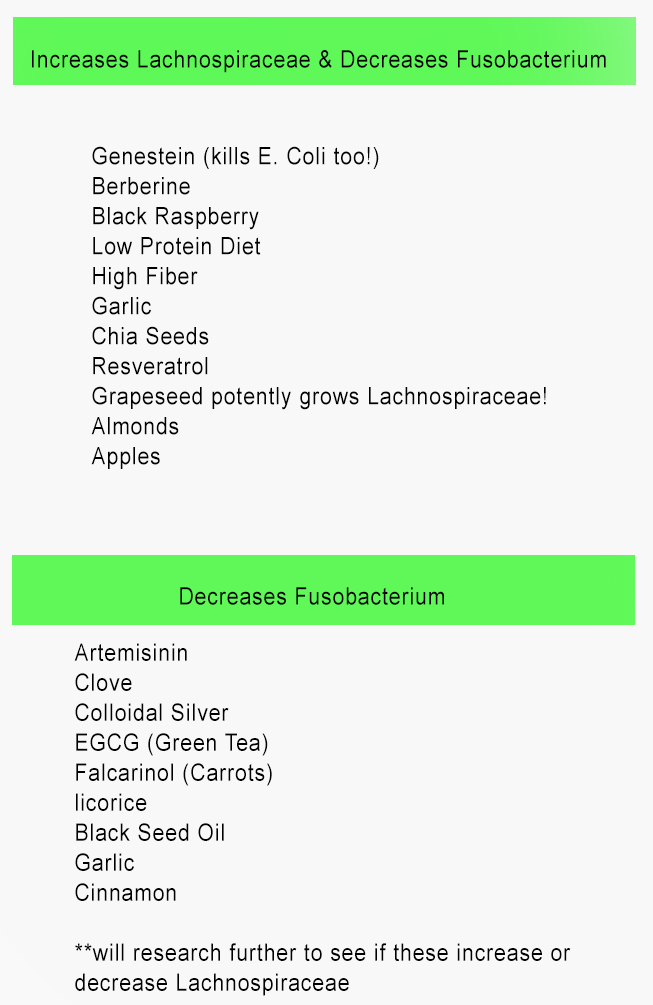
All bacteria, fungus, virus and parasites have preferred fuel sources.
Fusobacterium is fueled by amino acids, histidine and aspartate! It doesn’t use glucose as it’s main energy source.
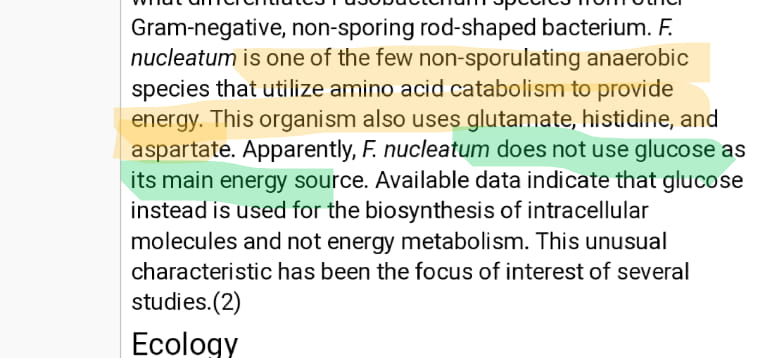
Thoughts about blocking metabolic pathways? I think targeting fat, protein (amino acids) and glucose is a great piece of the puzzle, but there may be additional things to target.
My theory is, it may help to target fuel of the particular bacteria that is associated with your cancer. Slow the replication then also add the dosage of substances that kills that intracellular pathogens, that also don’t cause resistance or lower the immune system.
Areas that could fine tuned;
Glutamine-I am extremely sensitive to excess amounts of glutamate, read my story here . Glutamate and glutamine convert back and forth to each other. There is a large group of people who have neurological symptoms with excess glutamate and so far drugs have not worked for controlling symptoms, only diet.
To lower glutamate with diet, avoid these food additives and any proteins heated at high temperatures or cooked for a long time (denatured or degraded). Wheat and dairy naturally contain a large amount of glutamate, even with no processing. Those two foods make up a large portion of most peoples diet, so it makes sense to get rid of those. Beyond food additives and processing there is a great resource for lowering glutamate with herbs and other foods here!
Statins can raise glucose…what!??? It’s true, the use of statins is associated with gaining Type II Diabetes. So one must ask, is it possible to block all pathways or is keeping all fuel sources low a better goal. The body seems to always compensate somehow. Speaking of that, I have heard that when you block glutamate with drugs the body forms more glutamate receptors. I’ve yet to find data on that, but it came from an respected physician who is a glutamate expert.
Doxycycline-All classes of antibiotics have been found to shrink tumors, but be careful, some can make cancer worse after initial progress like doxycycline for colorectal cancer. Article here!
Mebendazole warning! Phase 2 trial shows hyper-progression of cancer!!!
Thinking of trying Fenbendazole?
I was really excited about it until three people I know with colorectal cancer who were previously stable had aggressive metastasis all in one week. Then I started tracking cases and became very concerned. ***update 2021 after tracking people for a year. Fenbendazole is causing premature death (and not just for colon cancer). If you don’t believe me, just set a timer for every positive progress for 8 months to a year OR go back and see what happened to positive progress cases from a year or two ago.
Here are the results of my research so far.
Drug-Induced Liver Injury in a Patient with Nonsmall Cell Lung Cancer after Self-administration of Fenbendazole Based on Social Media Information.
https://www.karger.com/Article/FullText/516276
aFT3 is induced by FB. aFT3 activation promotes colorectal cancer metastasis.
https://www.ncbi.nlm.nih.gov/pubmed/24859834
https://www.ncbi.nlm.nih.gov/pmc/articles/PMC3436308
IL-8 is upregulated further by FB and promotes cancer cell migration and aggressiveness. Problem; IL-8 and its receptor CXCR2 are two of the most significantly upregulated chemokines in colorectal cancer. The third link shows that the bacteria responsible for CRC (fusobacterium) induces IL-8 and causes “robust migrations” of cancer cells aka metastasis. Some bendazoles like Fenbendazole significantly induce IL-8 which could cause aggressive metastasis.
https://www.ncbi.nlm.nih.gov/pubmed/20848085 https://www.ncbi.nlm.nih.gov/pubmed/22494524 https://www.biorxiv.org/content/10.1101/2020.01.15.907931v1.full
At low doses FB decreases Connexin 32 significantly; Connexins fill gap junctions in the intestines. They are also tumor suppressors. Colorectal cancer is associated with loss of connexin expression. They are critical for extracellular communication.
https://onlinelibrary.wiley.com/doi/pdf/10.1002/ijc.28911 https://journals.sagepub.com/doi/abs/10.1177/019262339902700509
P450 Fenbendazole upregulates P450. Increased P450 indicates poor prognosis in CRC.. Higher levels of P450 equal less detox and can turn procarcinogens into carcinogens.
In this study FB has been found to promote 33 genes for cancer “In conclusion, we here found 33 genes showing altered expression specific to the early stages of tumor promotion by fenbendazole.” This study showed suppression of PTEN (A major tumor suppresser) and upregulation of many tumor promotors.
Loss of villus epithelium and stroma within the small intestine of mammals. Passing tissue? Gastric pain?
Korean Doctors warn of intestinal necrosis and severe side effect from taking fenbendazole. Again….passing tumors OR necrotic death of intestines?
Fenbendazole kills Lachnospiraceae (protective of CRC) and most all bacteria hence the diarrhea, Cdiff, gastric pain. If cancer Is driven by bacteria this could provide temp shrinkage then resistance and then a roaring comeback.
Liver Tumor Promoting Effects of Fenbendazole in Rats.
“Since those agents that induce CYP 2B1/2 isozymes and reduce Cx32 in centrilobular hepatocytes have been suggested to be liver tumor promoters, the present results indicate that fenbendazole may be a liver tumor promoter.”
Increased tumor growth in the fenbendazole only treatment group. “Fenbendazole may have tumor-promoting activity in rats at therapeutic dosages (that is, through inhibition of connexin 32 and induction of cytochrome P450 enzymes 1A1 and 1A2).”
- Can cause Immune suppression of B and T cells and long-term severe effects in an autoimmune disease in mice that mimics Multiple Sclerosis.
We have a gene that makes us more sensitive to Fenbendazole than rats. Rats have to by “humanized” with this gene for comparison in lab studies. There are also slow metabolizers and fast.
- There are multiple parabens in the goat dewormer, not sure about other formulations.
- MSDS Toxicity data
- Liver is the main target but also stomach, kidneys, blood, immune system, and central nervous system were affected.
- High doses; renal, encephalomalacia, satellitosis, neuronophagia, perivascular inflammation or gliosis, hyperplasia and congestion of the mesenteric lymph nodes
- Cyst formation in lymph nodes, liver mass and/or nodule formation, and testicular masses were reported.
- https://www.cvear.com/wp-content/uploads/2012/06/078335976.pdf
Bone Marrow Hypoplasia Associated With Fenbendazole Administration in a Dog; sudden-onset of fever and malaise with low WBC count and bone marrow hypoplasia. Symptoms resolved in 15 days when Fenbendazole was stopped.
Potent interactions with acetaminophen in mice which led to 63% mortality
“No effect on tumors in mice our studies provided no evidence that fenbendazole warrants further testing as a potential agent for use in cancer therapy”.
Conclusion; Although the chemical structure of fenbendazole is similar to mebendazole (approved for humans), it works differently. I think we’ll know a lot more about it’s effects on humans in the future and for now I think it’s wise to avoid, especially if you’re stable.
***********2021 update- PHASE 2 TRIAL SHOWS HYPER PROGRESSION WITH MEBENDAZOLE! *****MORE INFO HERE
Here’s a study showing synergy with an antihelmith drug and immunotherapy which could explain Joe Tippin’s success. It’s something to watch if you follow immunotherapy.
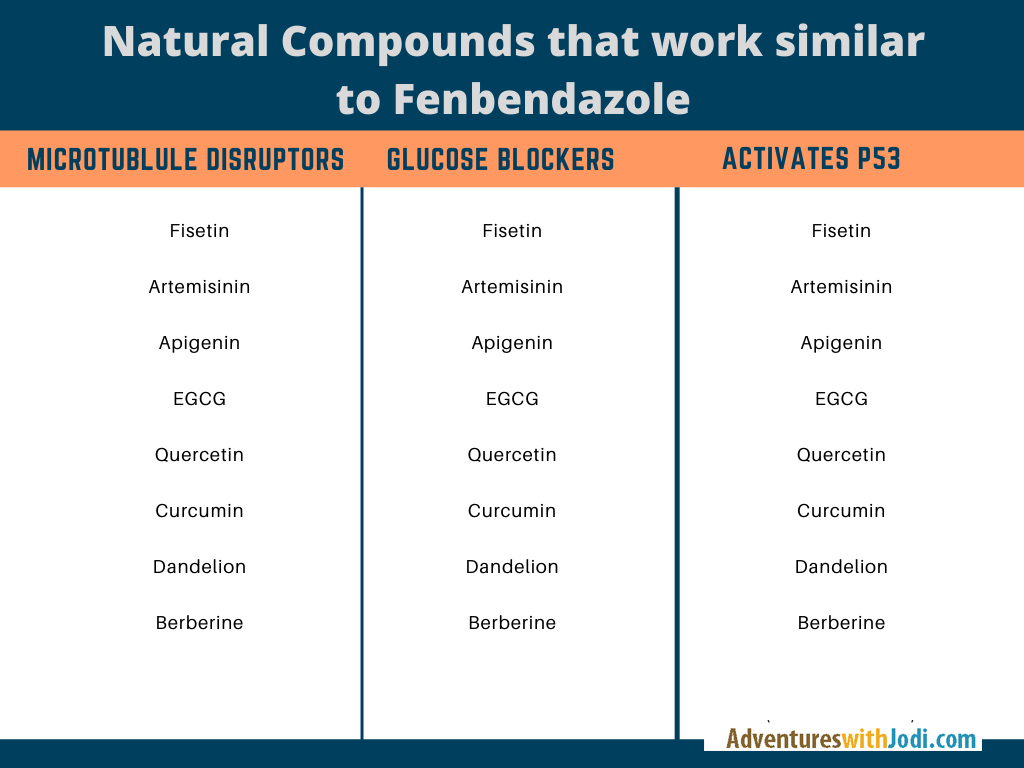
To print Natural Compounds that Work Similar to Fenbendazole, click here!
Here is a study on frequencies that kill cancer by mitotic spindle disruption, complete with proper frequency dosage per cancer!
**It mentions killing not just the fast dividing daughter cells, but the slower dividing cells as well!
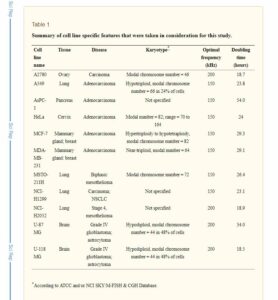
Amazing study on Fusobacterium!
The study found Fusobacterium in primary colorectal tumors and corresponding liver metastases. The strains matched identically even when collected months or years apart!
This suggests that Fusobacterium may migrate with the colorectal cancer cells to the metastatic site.
None of tumors without Fusobacterium were associated with a Fusobacterium-positive liver metastasis!
They higher the Fusobacterium amount in the tumors, the lower the survival time.
When they tried to transplant tumors to mice it only worked with the fusobacterium positive samples.
They took Fusobacterium from a tumor and added other human colon cancer cell lines. Under the microscope Fusobacterium bacteria from the primary tumor invaded the human colon cancer cell lines. Once the cell lines were infected with Fusobacterium, they saw bacterial cells within vesicle-like structures in the cancer cell.
***** Before reading the summary below-Antibiotics like doxycycline and metronidazole have been shown to promote colon cancer******* There are many foods that kill Fusobacterium without harming good bacteria.
"Finally, oral administration of metronidazole to mice bearing Fusobacterium-resulted in a statistically significant decrease in the trajectory of tumor growth Treatment with metronidazole was associated with a significant decrease in Fusobacterium load in the tumor tissue.
Our results highlight the need for further studies on microbiota modulation as a potential treatment for Fusobacterium-associated colorectal carcinomas. One concern is the negative effect of broad spectrum antibiotics on the healthy intestinal microbiota. Given that metronidazole targets a range of anaerobic bacteria, including co-occurring anaerobes that persist with Fusobacterium, one would ideally want to develop a Fusobacterium-specific antimicrobial agent.”
https://www.sciencedaily.com/releases/2019/07/190724090255.htm
MY THOUGHTS...
I feel that there will be an easy answer someday for CRC cancer caused by intracellular bacteria, either by antibiotic or probiotic but both have shown to be detrimental if they take out protective or native bacteria. That’s why I feel like raw food is the best antibiotic/probiotic at this time. Most Stage 4 colorectal cancer patients live 3 years on conventional treatments in my personal experience and have some stability from year to year, so it’s important to follow long term survivors. There are many substances that shrink tumors temporarily, the most reliable safest data is with long term survivors. See my Survivor Chart here!
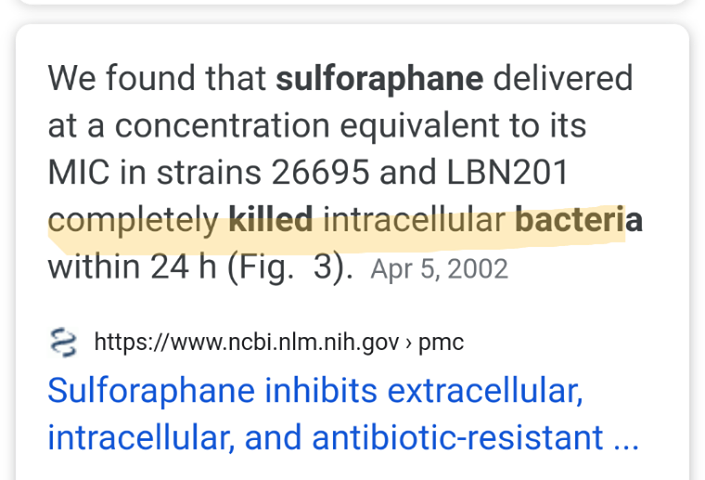
Colon Cancer Phytonutrient Cocktail! (sulforaphane!!!)
Researchers in Singapore, reporting in the journal Nature Biomedical Engineering, say they’ve discovered how compounds from cruciferous vegetables, mixed with probiotics, can create a “cocktail” that specifically attacks colon cancer cells while leaving healthy cells unaffected.
The neat trick about this potential treatment is that its active ingredient is one that’s made by our own bodies: a compound called sulforaphane, which is produced when we chew and digest cruciferous vegetables. To boost its potency, the researchers created a specific probiotic using harmless bacteria found in the human gut. The probiotic binds to a protein in colorectal cancer cells and helps with the creation of sulforaphane, which acts like a heat-seeking missile on cancer cells but has no effect on healthy cells.
In mouse studies, the cocktail decreased the number of tumors by 75 percent, while in test tubes the mixture destroyed more than 95 percent of cancer cells!
https://www.aarp.org/health/conditions-treatments/info-2018/vegetables-colon-cancer-fd.html
Go here to learn how to sprout!
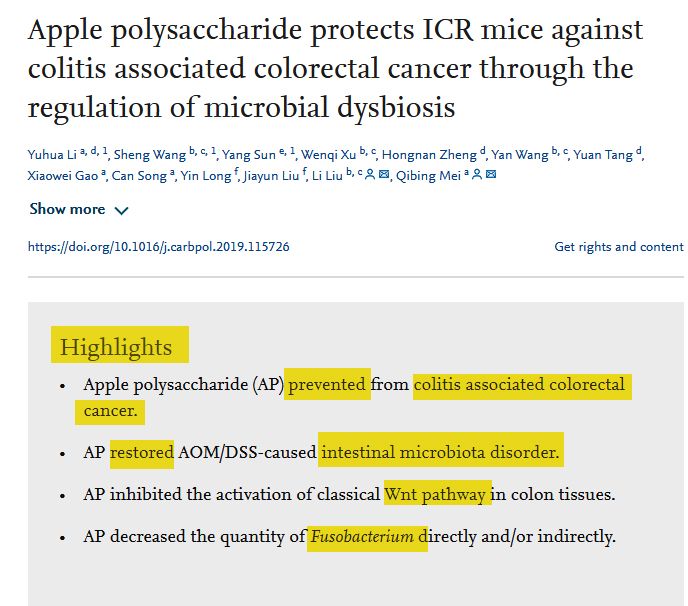
There was also a recent study on apples where they found and apple has 100 million bacteria including the bacteria that’s known to be deficient in breast cancer patients-methylobacterium! Buy organic and eat the whole thing except the stem.
Is a tumor just the way a body tries to protect itself from microorganisms? In the Merck manual it says a body’s defense to microorganisms is to wall it off!
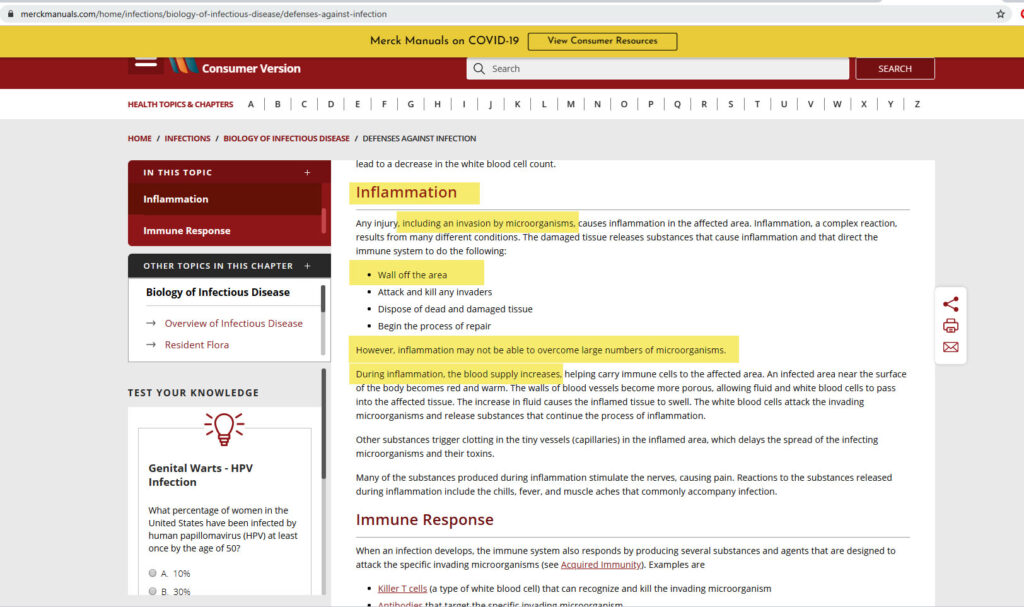
Below is a beautiful chart I found in a study that shows how plant flavonoids kill bacteria. I tried to list the plants source beside the flavonoid, hope you can zoom! If you look at the substances in 6, those reverse antibiotic resistance!
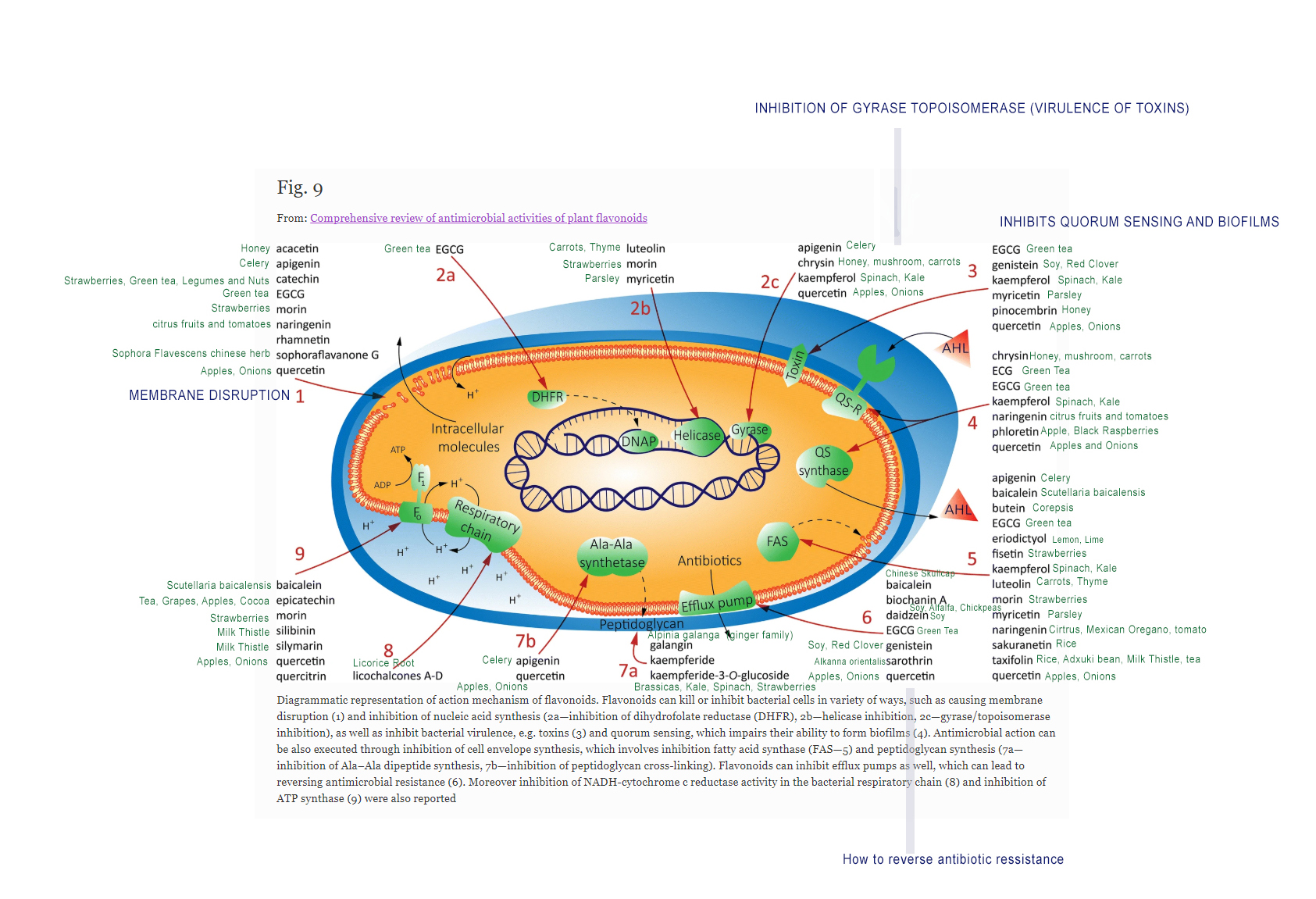
Below are other protocols that just happen to kill bacteria and also viruses and some parasites (they work together to get inside the cell)!
Rife- Via frequency
Gerson- Via antibacterial plant substances and grows protective bacteria with starch/fiber.
Hulda Clark- The dewormers and antimalarial combo she uses works for many resistant bacterias. Parasites are also a cause for cancer, bacterial infections make host susceptible.
Alk diet- Changing Ph can kill bacteria, plants bring fiber to feed good bacteria
Breuss Juice- Starves bacteria of fuel while flooding the body with antibacterial juice.
Raw Vegan- Lower all fuel sources of protein, glucose and fat. There are many fruits and veggies that block glucose uptake. Very antibacterial, lots of fiber to feed good bacteria and tons of enzymes which are now being tested as the best antibiotics for resistant bacteria!
Off label drugs- Starve bacteria of fuel sources (fat, protein, glucose) but even more so many of the non antibiotic off label drugs are now found to be effective for resistant bacteria. Autophagy drugs- I’m not convinced of whether blocking autophagy is good or bad, but I am convinced there are some really potent antibacterials for resistant bacteria in that group.
Chemo-Surprise! It’s used for certain bacterial infections.
Radiation- Kills bacteria
Black salve-very antibacterial
Jason Winters Tea-Very antibacterial
Essiac Tea- Very antibacterial
Jim Gordon’s Rainforest Herbs-I think this one on paper is really impressive!
Clinical cases of remission with the substances, EGCG (green tea), Curcumin, Colloidal Silver and falcarinol (carrots) , ALL very antibacterial for INTRA CELLULAR bacteria.
DCA- I’ve found a case of complete remission for colon cancer BUT also negative studies. Very antibacterial. Melanoma case remission (he did a lot of naturals too) DCA, Renal Cell case remission and more.
Coley’s Toxins- Strep bacteria kills other bacteria.
I could go on and on, you get the idea! Let’s find the safest method that doesn’t cause resistance or metastasis!